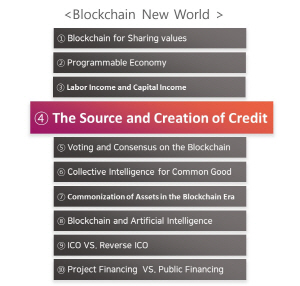


In last article ‘BLOCKCHAIN’S DISTRIBUTIVE JUSTICE ? FROM DILIGENT ANTS TO SMART GRASSHOPPERS,’ I discussed how blockchain is opening the era of capital income when the era of labor income is coming to a close. In this article, I‘d like to talk about a new financial perspective seen in blockchain’s light, from the perspective of the sourcing and creation of credit.
First of all, let’s look at the meaning of credit as defined in dictionaries.
In a Korean dictionary, credit has two definitions. One is ‘to trust someone or something without any doubt, or the extent of that trust. The second definition is an economic term, ‘the ability of someone to obtain goods or services before payment.’
Thus, credit means psychological state of trust as well as actual ability to pay. When the word credit is used in real economic activities, however, both meanings are mixed together.
Like I mentioned in the previous article, most people purchase goods or services on credit nowadays. Not many people can afford to buy a house with cash, and most people buy a house on credit. Credit here means that financial institutions give you money based on the trust that you will be able to pay it back over a period of time. That means, the trust on your ability to pay is credit.
In the current economic system, the sole authority of credit creation lies in financial institutions. While the foundation for credit is formed from the small savings from many ordinary people, it’s taken for granted by the few bank officials make decisions and that those ordinary people have no say in financial matters.
Until just a few years ago, sometimes even now, there are people who think this is the norms. However, after the US subprime mortgage crisis led to the bankruptcy of Lehman Brothers “doubt” became “conviction” for many. Few experts had made the decisions that led to the bankruptcy of a financial institution, yet people were able to witness that the consequences were suffered by the entire society. The voices of crowds that it is “not rational” grew higher and many alternatives were sought out. One of them was Satoshi Nakamoto and his experiment was the creation of cryptocurrency the Bitcoin.
Satoshi’s experiment started with questions like “Why do we have to leave the financial decision making to a few centralized financial institutions?” and “Why do a handful of people get to monopolize financial decisions and also most of the profit?” “Does a system that allows only a few people to make financial decisions while everyone has to bear the consequences of bad decisions make sense?”
In Bitcoin’s “Genesis Block,” Satoshi pointed out that there is a problem in this phenomenon in a witty, satirical way. While creating the genesis block, Satoshi left the following text quoted from a news article. “The Times 03/Jan/2009 Chancellor on brink of second bailout for banks.” It suggests that the centralized and monopolized creation of credit by governments and banks as well as the currency policy based on it failed and we all ended up assuming the responsibility. He gallantly raised questions about the current financial system through blockchain.
For existing legal tender, the central bank issues banknotes and other commercial banks create credit through a reserve system. Then, based on the created credit, commercial banks create another credit. It’s a large-scale credit creation mechanism. For example, the Bank of Korea holds on to 7% of what commercial banks received from its customers, in the form of a reserve. Let’s say 100 is received, 93 is lent out to customers. It means that banks can loan out customer’s money, allowing the use of money not meant for circulation, otherwise called credit creation. The financial system’s creation of credit based on legal tender is also the essence of capitalism.
Cryptocurrencies, led by bitcoin, is an attempt to decentralize this credit creation mechanism that revolves around the central banks. For example, Bitcoin showed that currencies can be digitized and digital currencies can be a method of payment on its own.
Bitcoin’s base technology “blockchain” can be used not only in financial transactions, but also in trading and recording all things with value. Currently, Bitcoin is seen as a digital currency based on blockchain technology, but its demand is holding up as the price surges creating credit based on people’s trust. The rise in price goes alongside the growth of people’s trust and faith creating new credit.
It’s not easy to pass Bitcoin as a sole medium of exchange due to limitations of transaction latency and high fees. However it has high demand and expectations as an investment instrument for its rising future value. Here we can be affirmed that the institution bestowing and creating trust doesn’t have to be a centralized organization.
Credit can be created based on the trust of a decentralized community, and the profit from the created credit is not meant just for a few people. It could be shared among the people who contributed to the community. Therefore, “sharing value” is the realization of economic justice for Blockchain. The sourcing and distribution of credit is possible within the distributed community or network of people who agree on the consensus algorithms based on smart contracts.
In this article, I explained about the sourcing and creation of decentralized credit that blockchain is trying to accomplish. In the next article, I am going to look at the methods of voting and finding consensus in a blockchain community. /Yezune Choi BOSCoin CEO
- Yezune Choi BOSCoin CEO








![비트코인 8만 8000달러선…주요 알트코인도 하락세[디센터 시황]](https://newsimg.sedaily.com/2025/12/15/2H1QMJVFUE_2_s.png)




![[단독]네이버파이낸셜, 해시드와 ‘코인 지갑’ 내달 선보인다](https://newsimg.sedaily.com/2025/11/25/2H0LB3A07Q_11_s.jpg)
![[단독]금융위 “공동검사 요구 과도”…스테이블코인 놓고 한은과 파열음](https://newsimg.sedaily.com/2025/11/24/2H0KUTU6OA_5_s.png)
![[단독] '은둔의 경영자' 송치형, 네이버와 합병 청사진 직접 밝힌다](https://newsimg.sedaily.com/2025/11/21/2H0JI570IZ_5_s.jpeg)








